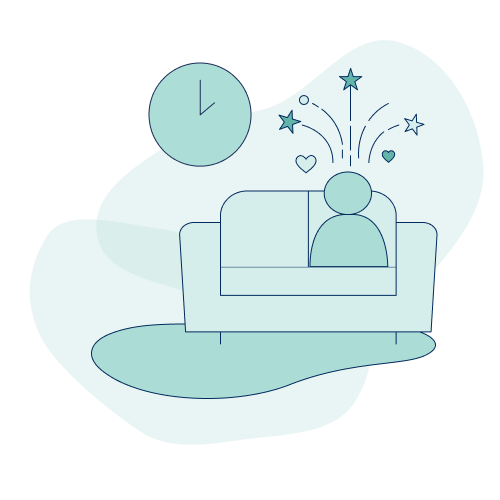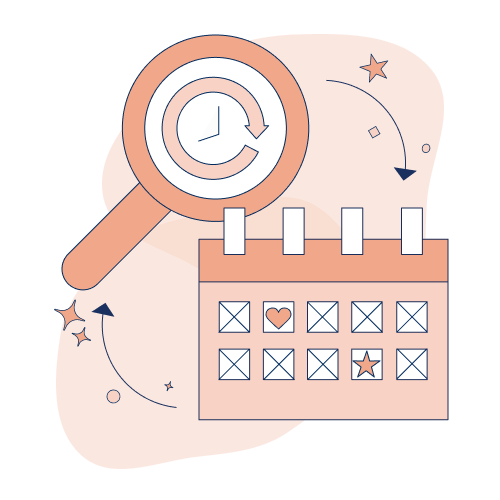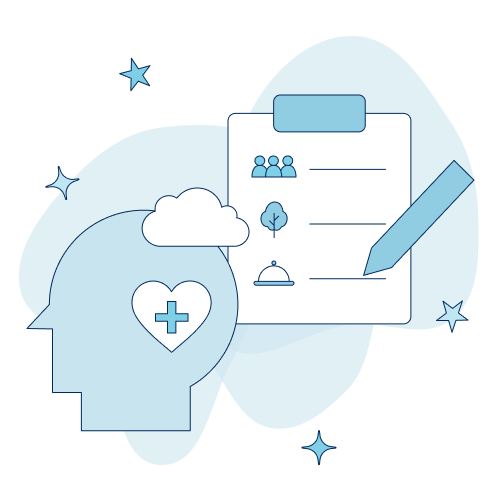

October 10th is World Mental Health Day, a day to bring awareness to those experiencing challenges with their mental health. This year, Amelia spoke with members of the Innovation Hub’s Leadership team to understand what it means for them to prioritize their mental health in the workplace.
Written by Ajeetha Vithiyananthan, Blog Writer, Bachelor of Science, Psychology specialist and Sociology minor and Amelia Di Meo, Research Coordinator, Master of Health Sciences, Translational Research
October 10th is World Mental Health Day. Founded by the World Federation for Mental Health (WFMH), this global initiative aims to raise awareness for mental health and to garner support for those experiencing challenges with their mental health. Every year, the day is centered around a theme, as announced by the WFMH President. This year’s theme is prioritizing mental health in the workplace.
To mark this day, members of the leadership team at the Innovation Hub reflected upon how they prioritize their mental health while at work and offer suggestions on how we can advocate for better support to improve our own mental health.
Prioritizing Rest

Learning to unplug in a workplace and find time for rest can be difficult, but the benefits of doing so can set you up for success both at work and in your personal life. Thaksha Krishnagumar, Team Lead for the Reception Experiences at Health & Wellness Project, described the importance of checking in with herself and the emotions of her team members. Thaksha said,

“As a Design Research Team Lead, it is crucial that not only do I take care of my research participants, but I also take care of my team members, the leadership team and myself. Specifically, when it comes to me, I acknowledge that I fell in love with research through my curiosity for accessibility – it’s been almost 8 years of this journey. With this in mind, it is important for me to recognize when I get upset or overwhelmed when doing my work as I am very passionate about it. It is crucial that I take a step back to reflect, ground myself and come back into the working space with a different mindset and approach. By doing so, it fosters trust and a way to move forward that considers mental health and accessibility in the workplace.”
Hayley Park, Senior Project Assistant & Communications Lead, described how taking time to rest is necessary for her to feel fully present and produce her best work. Hayley said,

“It’s easy to forget to take care of ourselves when we become so immersed in our projects. But we can’t fully show up to work (or anything for that matter) as ourselves if we aren’t taking time to connect, reflect and re-center with ourselves from time-to-time. Invest in your rest!”
As our team leads have shared, rest helps us to be fully present, allowing us to show up as our best selves and excel at work but also in our multiple roles and responsibilities that we carry throughout the day.
Making Time for Wellbeing

While finding the time to unplug from work can be difficult, our leadership team has come up with creative/unique ways to make the time to rest. Katrina Sze Ching Soong, Qualitative Data Archivist Team Lead, described how she uses time-blocking to schedule in consistent times for herself to rest during the day. Katrina said,

“Time-blocking hours for myself to take breaks helps me prioritize my mental health! So, rather than working through lunch, I block an hour for lunch to take a break.”
Similarly, Ruth, Arts & Science UTQAP Research Lead & Program Coordinator, discussed how she re-framed the weekdays beyond work by finding opportunities to catch up with loved ones. Ruth said,

“I like to make plans with friends and family after work so weekdays don’t feel like they’re exclusively for working.”
Recognizing periods of rest for yourself throughout the day was an important healthy habit many of our team members build into their day to maintain mental health.
Creating Habits that Promote Mental Health

After blocking off time for rest, thinking about how to rest during that time can also be a challenge in itself. Our Team Leads share their differing strategies on how they often use their rest time to ground themselves. Thaksha described how she leverages trauma-informed practices to ground herself and her team while at work. Thaksha said,

“Strategies to advocate and prioritize mental health at work involves leveraging trauma-informed practices – an approach that I am continuously trying to learn about. This means creating a safe environment for team members to always have time to debrief their thoughts and feelings after research sessions, and welcoming ideas that care for one another such as including trigger words in the summary section for transcripts; which leads to being mindful of others in the cleaning and coding stages of research.”
Antik Dey, Team Lead for the Equity, Diversity, Inclusion, and Access Project at the School of Environment project described his strategy for reducing his screen time. Antik said,

“I try to be mindful of my screen time, and ensure to give myself enough breaks. For instance, for every 20 minutes of screen time, it is recommended that you look away for 20 seconds. It also helps to maintain healthy professional relationships with your colleagues so you can be there for each other during difficult times.”
Similarly, Lauren talked about how important it is for her to use her rest time to eat. Lauren said,

“I prioritize my mental health at work by making sure I eat. When my workload increases or I’m feeling down, I tend to forget to take care of myself, especially when it comes to meals. To address this, I make it a point to find restaurants or relaxing spots around campus where I can take a break, enjoy lunch, and recharge. This not only nourishes my body but also keeps my mind strong. If you struggle with this too, my advice is to schedule lunch breaks, meal prep a favourite dish or find a restaurant you’re excited to try. Discovering new places to eat has become a hobby for me, and it’s a great way to ensure I prioritize my mental health while at work!”
It’s clear that for our team members, creating healthy habits supports their mental health. Making moments to take care of themselves can look different to different people. Perhaps it is scheduling in short breaks, taking time to eat, or checking in on emotional well-being and the well-being of your co-workers, we urge our readers to think about what your healthy habits might be. Then, experiment and find the best strategy that works for you!
Looking Beyond Today
Taking care of our mental health is an ongoing process. Below, we’ve included some resources that help build strategies to support finding rest and being a champion of mental health.
General Resources
- Read the Announcement of the theme for World Mental Health Day 2024:
- Use the Healthy Mind Platter to plan time for well-being into your day
- Read the article from Headspace about how to implement mindfulness at work
- Review the Guidelines on Mental Health at Work from the World Health Organization
Mental Health Resources at U of T:
- Read through the University of Toronto Student Mental Health Resource
- Access the Mental Health Clinical Services
- Attend the Hart House Well-Being Collective
- Use Navi to learn more about mental health resources at U of T
0 comments on “World Mental Health Day: Prioritizing Mental Health in the Workplace”